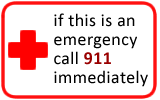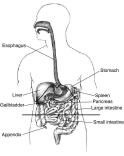Abdominal Pain - Upper
Abdominal Pain - Upper
Does this describe your symptoms? |
Click image for more info |
Definition
General Information
Top Causes of Upper Abdominal Pain in Men Younger than 50 Years of Age
Top Causes of Upper Abdominal Pain in Individuals Older than 50 Years of Age
Other Causes
A Warning about "Indigestion": Some individuals can have a heart attack and just think that it is "indigestion". You should especially consider the possibility of a heart attack if you are over 40 years old or if you have any cardiac risk factors. Cardiac risk factors include: diabetes, hypertension, high cholesterol, obesity, smoking, and a family history of heart attack at an age of less than 60. |
If not, see these topics
|
When to Call Your Doctor |
Call 911 Now (you may need an ambulance) If |
|
|
|
Call Your Doctor Now (night or day) If |
|
|
|
Call Your Doctor Within 24 Hours (between 9 am and 4 pm) If |
|
|
|
Call Your Doctor During Weekday Office Hours If |
|
|
|
Self Care at Home If |
|
|
HOME CARE ADVICE FOR MILD UPPER ABDOMINAL PAIN |
Reassurance: A mild stomachache can be from indigestion, stomach irritation, or overeating. Sometimes a stomachache signals the onset of a vomiting illness from a viral infection.
Fluids: Sip clear fluids only (e.g., water, flat soft drinks or ½ strength fruit juice) until the pain is gone for 2 hours. Then slowly return to a regular diet.
Diet:
Slowly advance diet from clear liquids to a bland diet.
Avoid alcohol or caffeinated beverages.
Avoid greasy or fatty foods.
Stop Smoking: Smoking can aggravate heartburn and stomach problems.
Avoid Aspirin: Avoid aspirin and anti-inflammatory medications (e.g., Motrin, Advil, Aleve, Naproxen). These medications can cause stomach irritation. Try taking acetaminophen (e.g., Tylenol), which does not cause stomach irritation.
Antacid: If having pain now, try taking an antacid (e.g., Mylanta, Maalox). Dose: 2 tablespoons (30 ml) of liquid by mouth.
Reflux Symptoms (GERD): Eat smaller meals and avoid snacks for 2 hours before sleeping. Avoid the following foods which tend to aggravate heartburn and stomach problems: fatty/greasy foods, spicy foods, caffeinated beverages, mints, and chocolate.
Expected Course: With harmless causes, the pain usually lessens or is resolved in 2 hours. With gastroenteritis, stomach cramps may precede each bout of vomiting or diarrhea. With serious causes (such as appendicitis), the pain becomes constant and severe.
Call Your Doctor If:
Abdominal pain is constant and present for more than 2 hours.
You become worse
And remember, contact your doctor if you develop any of the "Call Your Doctor" symptoms.
Updated:
October 06, 2017




